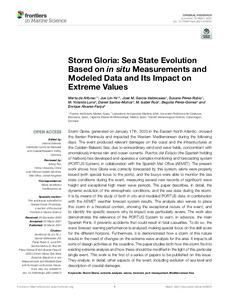Por favor, use este identificador para citar o enlazar este ítem:
http://hdl.handle.net/20.500.11765/12881
Storm Gloria: sea state evolution based on in situ measurements and modeled data and its impact on extreme values
| Título : | Storm Gloria: sea state evolution based on in situ measurements and modeled data and its impact on extreme values |
| Autor : | Alfonso, Marta de; Lin-Ye, Jue; García-Valdecasas, José María; Pérez-Rubio, Susana; Luna Rico, Yolanda



|
| Palabras clave : | Storm Gloria; Extreme analysis; Waves; forecasF; Port management |
| Fecha de publicación : | 2021 |
| Editor: | Frontiers Media |
| Citación : | Frontiers in Marine Science. 2021, 8:646873 |
| Versión del editor: | https://dx.doi.org/10.3389/fmars.2021.646873 |
| Resumen : | Storm Gloria, generated on January 17th, 2020 in the Eastern North Atlantic, crossed the Iberian Peninsula and impacted the Western Mediterranean during the following days. The event produced relevant damages on the coast and the infrastructures at the Catalan-Balearic Sea, due to extraordinary wind and wave fields, concomitant with anomalously intense rain and ocean currents. Puertos del Estado (the Spanish holding of harbors) has developed and operates a complex monitoring and forecasting system (PORTUS System), in collaboration with the Spanish Met Office (AEMET). The present work shows how Gloria was correctly forecasted by this system, alerts were properly issued (with special focus to the ports), and the buoys were able to monitor the sea state conditions during the event, measuring several new records of significant wave height and exceptional high mean wave periods. The paper describes, in detail, the dynamic evolution of the atmospheric conditions, and the sea state during the storm. It is by means of the study of both in situ and modeled PORTUS data, in combination with the AEMET weather forecast system results. The analysis also serves to place this storm in a historical context, showing the exceptional nature of the event, and to identify the specific reasons why its impact was particularly severe. The work also demonstrates the relevance of the PORTUS System to warn, in advance, the main Spanish Ports. It prevents accidents that could result in fatal casualties. To do so, the wave forecast warning performance is analyzed, making special focus on the skill score for the different horizons. Furthermore, it is demonstrated how a storm of this nature results in the need of changes on the extreme wave analysis for the area. It impacts all sorts of design activities at the coastline. The paper studies both how this storm fits into existing extreme analysis and how these should be modified in the light of this particular single event. This work is the first of a series of papers to be published on this issue. They analyze, in detail, other aspects of the event, including evolution of sea level and description of coastal damages. |
| URI : | http://hdl.handle.net/20.500.11765/12881 |
| ISSN : | 2296-7745 |
| Colecciones: | Artículos científicos 2019-2022 |
Ficheros en este ítem:
| Fichero | Descripción | Tamaño | Formato | ||
|---|---|---|---|---|---|
| fmars-08-646873.pdf | 4,89 MB | Adobe PDF |  Visualizar/Abrir |
Los ítems de Arcimis están protegidos por una Licencia Creative Commons, salvo que se indique lo contrario.





